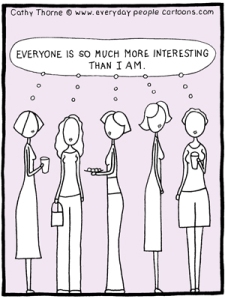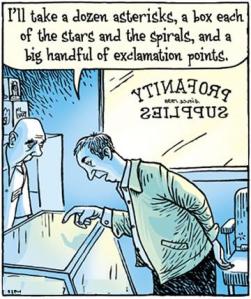
This week, I finally read C. S. Lewis’ The Weight of Glory. It’s a rather short piece. I read it it one sitting, and I think he originally gave it as an address of some sort. In it, Lewis defines the “glory” that we have in store for us as Christians and speaks about how we should (or, often as not, shouldn’t live) in light of that revelation.
As I was reading it, I was reminded of Ecclesiastes (not that a lot of things don’t remind me of Ecclesiastes!) because Lewis talks about things like duty, accolade, promises, and the “inconsolable secret” of humankind—”We should hardly dare,” he writes, “to ask that any notice be taken of ourselves. But we pine. The sense that in this universe we are treated as strangers, the longing to be acknowledged, to meet with some response, to bridge some chasm that yawns between us and reality, is part of our inconsolable secret.”
Isn’t that similar to what Solomon is lamenting? Solomon laments that “all is vanity” not just to lament, but because he is unsatisfied with his immediate earthly surroundings. Lewis argues that that sense—the idea that we are all strangers in strange lands—is one that is inherent in our thinking.
What also struck me as interesting (and this quote is rather long), but Lewis also mentions how nonbelievers often urge Christians to throw away this notion:
“Finally,” writes Lewis, “lest your longing for the transtemporal should awake and spoil the whole affair, they use any rhetoric that comes to hand to keep out of your mind the recollection that even if all the happiness they promised would come to man on earth, yet still each generation would lose it by death, including the last generation of all, and the whole story would be nothing, not even a story, for ever and ever. Hence all the nonsense that Mr. Shaw puts into the final speech of Lilith, and Bergson’s remark that the élan vital is capable of surmounting all obstacles, perhaps even death—as if we could believe that any social or biological development on this planet will delay the senility of the sun or reverse the second law of thermodynamics.”
Emphasis mine. And, wow, that sounds a lot like Solomon, especially the parts about losing what we have gained to the next generation and so on and so forth. And just as Lewis speaks of natural laws as ensuring mediocrity for us, so Solomon does as well when he laments that everything runs in circles, nothing is new, and all that has been will be.
C. S. Lewis concludes that we carry with us the weight of a kind of glory we do not often enough imagine: “To please God. . .to be a real ingredient in the divine happiness. . .to be loved by God, not merely pitied, but delighted in as an artist delights in his work or a father in a son—it seems impossible, a weight or burden of glory which our thoughts can hardly sustain. But so it is.”
Ecclesiastes 3
A Time for Everything
Chapter 3 begins with the famous list about how there is a time set aside in the human existence to do everything and experience everything under the sun. If I’m looking at this from Solomon’s perspective of “vanity,” what can I find that is “vain” in this list?
First of all, I notice that Solomon couples “good” things with “bad.” For instance, birth and death (v.2), weeping and laughing (v.3), love and hate (v.8). This seems to imply that for every “good” thing we experience, we also experience a “bad” thing of the same gravity.
That seems pretty vain. If I am taking the least optimistic perspective possible, I would argue that the “good” things do nothing if they are going to be intrinsically coupled with the “bad.” And yet there is no denying that this list encapsulates the human experience. Solomon is not exaggerating. Good things happen. Bad things happen. By this logic, it really is vain to live at all on earth. And if there is no hope for satisfaction here, where might we find it? And, here, I feel as though we may obviously look to a life after death, to “glory”—as Lewis would say—and know of our hope. But Solomon does not explicitly mention this yearning nor this guarantee.
Some might argue that there is no hope for satisfaction, that heaven (and hell) does not exist and that we are blindly putting our trust in something that we have no way of knowing is true. Lewis makes an interesting argument for the existence of a “hope”:
“A man’s physical hunger does not prove that man will get any bread; he may die of starvation on a raft in the Atlantic. But surely a man’s hunger does prove that he comes of a race which repairs its body by eating and inhabits a world where eatable substances exist. In the same way, though I do not believe (I wish I did) that my desire for Paradise proves I that I shall enjoy it, I think it a pretty good indication that such a thing exists and that some men will.”
The God-Given Task
Verse 9 begins with a question: “What gain has the worker from his toil?” And later in verses 12–13 Solomon concludes: “I perceived that there is nothing better for them than to be joyful and to do good as long as they live; also that everyone should eat and drink and take pleasure in all his toil—this is God’s gift to man.” The one thing that Solomon finds consistently good in Ecclesiastes is the satisfaction that humans gain from their work. He’s already decided that the material gain from the work itself is worthless (and plainly being lazy is worthless). If by nothing other than the process of elimination, he decides that it is the satisfaction from the work that is worthwhile.
The verses that I have left out (10–11) have always been some of my favorite, although I must admit that I feel I have never quite fullly understood them (and certainly am not claiming to now). Solomon writes: “I have seen the business that God has given to the children of man to be busy with. He has made everything beautiful in its time. Also he has put eternity into man’s heart, yet so that he cannot find out what God has done from the beginning to the end.”
They seem like they’re kind of thrown in there. I can kind of understand verse 10: God made humans with a natural inclination to be productive, to want to use their talents and gifts. But then about making things beautiful in their time, about eternity in man’s heart, about a mystery that we suspect might exist but cannot fathom—these are quite poetic, and they touch my heart in a way that I can’t explain. They make me remember both the smallness of my own self and the enormity of purpose that God has imbued creation with.
While reading The Weight of Glory, I was reminded of Ecclesiastes when Lewis started speaking about beauty. He describes it as being part of the “inconsolable secret,” the sense of “unbelonging,” that I mentioned earlier.
Lewis writes: “I am trying to rip open the inconsolable secret in each one of you—the secret which hurts so much that you take your revenge on it by calling it names like Nostalgia and Romanticism and Adolescence; the secret also which pierces with such sweetness that when, in very intimate conversation, the mention of it becomes imminent, we grow awkward and affect to laugh at ourselves; the secret we cannot hide and cannot tell, though we desire to do both. We cannot tell it because it is a desire for something that has never actually appeared in our experience. We cannot hide it because our experience is constantly suggesting it, and we betray ourselves like lovers at the mention of a name. Our commonest expedient is to call it beauty and behave as if that had settled the matter.”
He goes on to describe the things that we find beautiful as being mere reflectors of God. Just like the moon reflects the sun, so creation reflects the glory of God. But even if we rise with great effort to the moon in search of the light which shines so warmly upon us in the day, we will find nothing upon the moon but a dusty and barren wasteland, devoid of the light that it at first seemed to have. We have been looking in the wrong places. Such is our experience with loving the beautiful things of this world in an effort to satisfy our souls with something other than God.
On the subject of mysteries, verses 14 and 15 contain another one for me. Solomon has already talked about the work of humans being transient. In these verses, he talks about the work of God lasting forever. He also seems to speculate that this is why history seems to repeat itself and why the earth seems to move in cycles of happening—because everything that happens has a common denominator: God. It only makes senses that every act and event would ring with the presence of the Immortal. I am not sure, however, what Solomon means in the second part of verse 15 when he writes: “That which already has been; that which is to be, already has been; and God seeks what has been driven away.”
From Dust to Dust
Here again, Solomon laments that in place of a “good” there is and “evil.” And having seen that we can do nothing about the vainness of this, he seems to make a number of statements that release the responsibility of changing what is unfair to God. He begins both verse 17 and verse 18 with “I said in my heart.” Both sentences seem to contain important insights into Solomon’s thinking. In verse 17, Solomon concludes that it is God who will make right every wrong, again because “there is a time for every matter and for every work.”
Here, I realize, that before I was looking at the list of “times” as though they were describing the human experience. Then, Solomon spoke about the common denominator of God in all things. It only make sense here to conclude that if God is present in everything, he is present in every “time” that there could possibly be, in every good and every bad. In fact, Solomon seems to be implying here that “times” are not arbitrary; instead, they are designated by God, and he makes his own intervention into the affairs of man.
In verse 18, Solomon concludes that God is testing us with travesty. What for? Apparently “that they may see that they themselves are but beasts.” This seems contradictory to most Biblical accounts in which humans are compared to animals. Most of the time, we seem humanity as being set above the rest of creation. Here, Solomon makes humans into beasts. Why?
Solomon answers my question for me in verses 19–21: “For what happens to the children of man and what happens to the beasts is the same; as one dies, so dies the other. They all have the same breath, and man has no advantage over the beasts, for all is vanity. Who knows whether the spirit of man goes upward and the spirit of the beast goes down into the earth?”
Solomon compares the experiences of both humans and animals. A lot of the same things happen to both of them. So, he asks, and this seems to be his most pressing question: Does the same thing happen to both when they die? Again, taking the most pessimistic perspective possible, I have no other choice but to expect the worst. Solomon concludes that this means that we must enjoy ourselves by working while we are alive. Because if we have no hope for anything after death, then I guess we better make the most of life now.
This, of course, is puzzling to me. I’m not sure where Solomon is going with this. He seems rather hesitant to mention any kind of “afterlife” yet seems quite concerned with the idea and the gravity of God’s presence in all things. Again, I am reminded of how Lewis talks about the nature of humans, and I would like to conclude with this:
“You have never talked to a mere mortal. Nations, cultures, arts civilisations—these are mortal, and their life is to ours as the life of a gnat. But it is immortals whom we joke with, work with, marry, snub, and exploit—immortal horrors or everlasting splendors. This does not mean that we are to be perpetually solemn.”
I don’t often think about the inherent immortality in every human. Lewis is right: The thought might be overwhelming at times. But if we are to live in light of God, we must also live in light of the Gospel and what has been offered to humankind.









